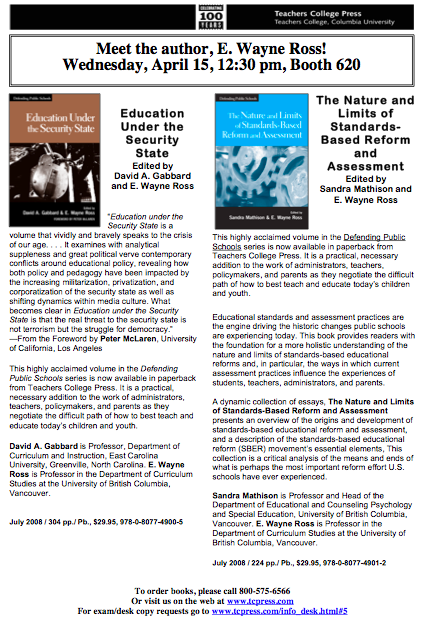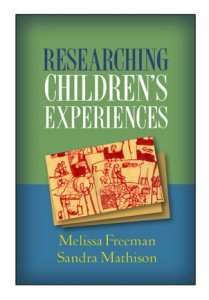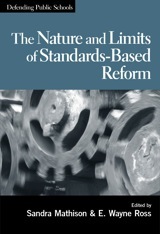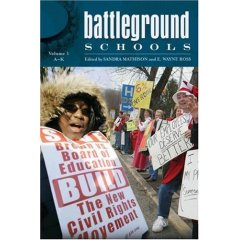New Directions for Evaluation
Sandra Mathison, Editor-in-Chief
![0787983942.jpg]() New Directions for Evaluation (NDE), is a peer-reviewed journal that publishes empirical, methodological, and theoretical works on all aspects of evaluation. An NDE issue contains between 37,500 and 42,500 words, and usually consists of a brief editorial introduction and 6 to 8 chapters that address and develop the topic, method, or theme. Typically, an issue includes several authors, but single or co- authored issues will be considered. All proposals will be considered, and we especially encourage proposals that focus on the following topics:
New Directions for Evaluation (NDE), is a peer-reviewed journal that publishes empirical, methodological, and theoretical works on all aspects of evaluation. An NDE issue contains between 37,500 and 42,500 words, and usually consists of a brief editorial introduction and 6 to 8 chapters that address and develop the topic, method, or theme. Typically, an issue includes several authors, but single or co- authored issues will be considered. All proposals will be considered, and we especially encourage proposals that focus on the following topics:
History of evaluation: What is the genesis of evaluation as a discipline, as a profession, as a practice? How has evaluation evolved over time?
Worth of evaluation: Evaluation is difficult and costly. Do the benefits of evaluation warrant the costs, real and opportunity? What is the value of evaluation?
Human rights and evaluation: Much evaluation is focused on human service programs providing services to individuals and communities. How does evaluation effect, protect, acknowledge human rights? Are strategies like ethics review boards useful and appropriate in evaluation?
Causation and evaluation: What are the frameworks for understanding and establishing causation in evaluation? How can and should attribution of effects be made?
Qualitative-quantitative debate in evaluation: How has this debate effected evaluation methodology? Does this debate mask poor quality in either or both? What does the advocacy of mixed methods contribute to this debate?
Evaluation of complex systems: What can evaluation contribute, and how, in increasingly complex systems of program delivery (interconnections across levels of government, complex social systems, partnerships)?
Other topics of interest:
o evaluation in the small non-profit sector
o organizational self evaluation
o quantitative methods in evaluation (e.g. non-parametric statistics, HLM, latent trait theory)
o representation and reporting in evaluation (e.g. visual imagery, media, effective formats)
o conflict and dispute resolution and evaluation
o internal evaluation
o uses of technologies in evaluation (e.g. software, iPods, hand held devices, monitors, surveillance)
o evaluation of technologies (e.g. online learning, computers, internet)
More details about submitting proposals for NDE can be found at http://www.eval.org/Publications/NDE.asp
Contact Sandra Mathison at nde@eval.org
 Follow
Follow

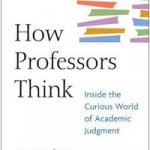 Michele Lamont in How Professors Think: Inside the Curious World of Academic Judgment opens the Pandora’s Box of peer review, the primary form of evaluation in higher education. Lamont’s curiosity, like Pandora’s, reveals secretive deliberations that all too often amount to judgments of quality based on the similarity of the work being judged to that of the judges. Lamont examines differences across disciplines, highlights the tension between the idea of having independently established criteria and standards and the inevitability of situational deliberation on what is good or bad, and ultimately calls for a more open, transparent approach to evaluation in higher education. In this later move, she searches for the hope that Pandora found at the bottom of the box.
Michele Lamont in How Professors Think: Inside the Curious World of Academic Judgment opens the Pandora’s Box of peer review, the primary form of evaluation in higher education. Lamont’s curiosity, like Pandora’s, reveals secretive deliberations that all too often amount to judgments of quality based on the similarity of the work being judged to that of the judges. Lamont examines differences across disciplines, highlights the tension between the idea of having independently established criteria and standards and the inevitability of situational deliberation on what is good or bad, and ultimately calls for a more open, transparent approach to evaluation in higher education. In this later move, she searches for the hope that Pandora found at the bottom of the box.